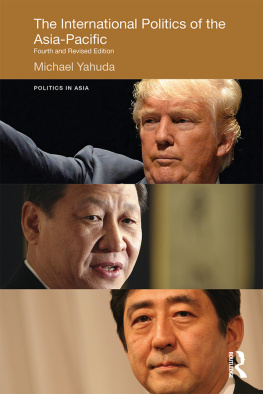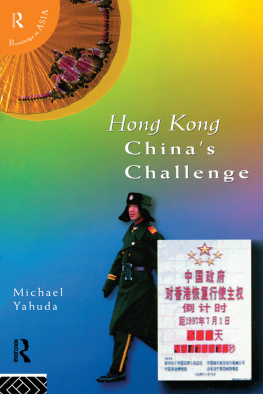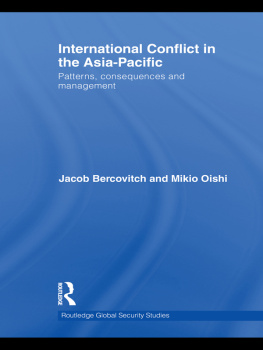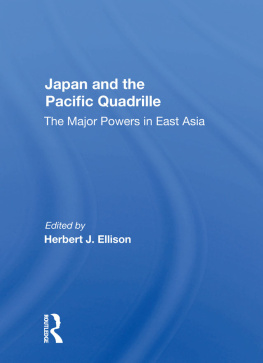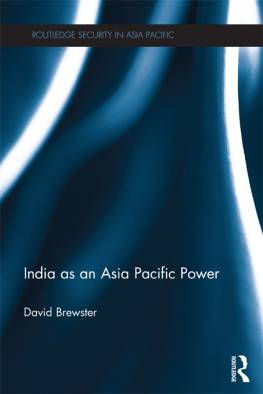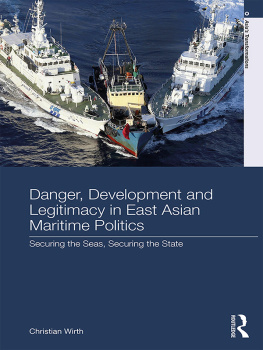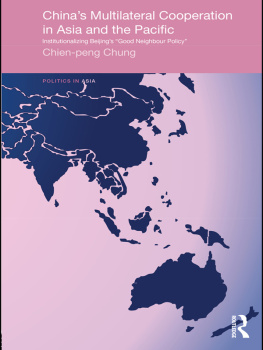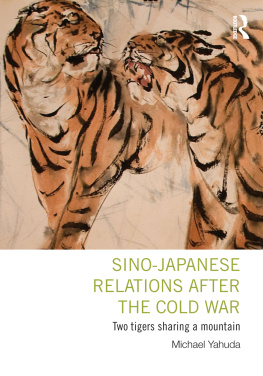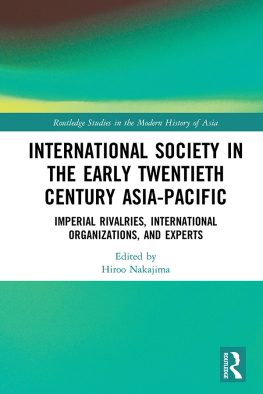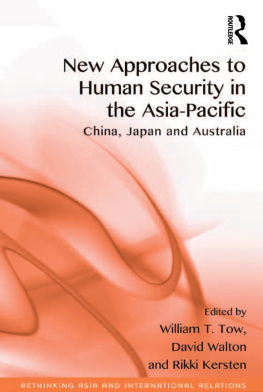Yahuda - The International Politics of the Asia-Pacific
Here you can read online Yahuda - The International Politics of the Asia-Pacific full text of the book (entire story) in english for free. Download pdf and epub, get meaning, cover and reviews about this ebook. City: Asiatisch-Pazifischer Raum, Array, Array, year: 2019, publisher: Routledge, genre: Politics. Description of the work, (preface) as well as reviews are available. Best literature library LitArk.com created for fans of good reading and offers a wide selection of genres:
Romance novel
Science fiction
Adventure
Detective
Science
History
Home and family
Prose
Art
Politics
Computer
Non-fiction
Religion
Business
Children
Humor
Choose a favorite category and find really read worthwhile books. Enjoy immersion in the world of imagination, feel the emotions of the characters or learn something new for yourself, make an fascinating discovery.
The International Politics of the Asia-Pacific: summary, description and annotation
We offer to read an annotation, description, summary or preface (depends on what the author of the book "The International Politics of the Asia-Pacific" wrote himself). If you haven't found the necessary information about the book — write in the comments, we will try to find it.
Yahuda: author's other books
Who wrote The International Politics of the Asia-Pacific? Find out the surname, the name of the author of the book and a list of all author's works by series.
The International Politics of the Asia-Pacific — read online for free the complete book (whole text) full work
Below is the text of the book, divided by pages. System saving the place of the last page read, allows you to conveniently read the book "The International Politics of the Asia-Pacific" online for free, without having to search again every time where you left off. Put a bookmark, and you can go to the page where you finished reading at any time.
Font size:
Interval:
Bookmark:

This fully revised fourth edition of Michael Yahudas successful textbook brings the subject up-to-date, introducing students to the international politics of the Asia-Pacific region since 1945. Following an evaluation of the legacy of the Cold War the author assesses the uncertainties of the post-Cold War era, the weakening of America by its prolonged warfare in the greater Middle East, by the enlarged war on terror and by the financial crisis of 20078. Amid the decline of the liberal world order and the rise of China, the author examines Chinese attempts to establish a new order. Analyzing politics in terms of the interplay between global, regional and local developments, this new edition also features,
- Discussion and evaluation of the Trump presidency and its implications for the Asia-Pacific region.
- Examination of the continued rise of China, especially under the more assertive personal Party dictatorship of Xi Jinping and its impact on the region.
- Analysis of the resurgence of Japan as a major power and its attempt to counter Chinas assertiveness by a coalition of regional democracies.
- Assessments of the repercussions of these developments on the regional hotspots of the Korea Peninsula, a democratic Taiwan and a disjointed Southeast Asia.
This new fourth edition will continue to be a core text for students of Asian politics, international relations and Cold War history.
Michael Yahuda is Professor Emeritus of International Relations at the London School of Economics, UK, and visiting scholar at the Sigur Center for Asian Studies, The Elliot School, George Washington University, USA.
China and Transboundary Water Politics in Asia
Edited by Hongzhou Zhang and Mingjiang Li
The Road to Federalism in Nepal, Myanmar and Sri Lanka
Finding the Middle Ground
Michael G Breen
US-China Competition and the South China Sea Disputes
Edited by Huiyun Feng and Kai He
National Identity and Great-Power Status in Russia and Japan
Non-Western Challengers to the Liberal International Order
Tadashi Anno
Distributive Politics in Malaysia
Maintaining Authoritarian Party Dominance
Hidekuni Washida
Japans Island Troubles with China and Korea
Prospects and Challenges for Resolution
Victor Teo and Haruko Satoh
Regional environmental politics in Northeast Asia
Conflict and Cooperation
JeongWon Bourdais Park
The International Politics of the Asia-Pacific
Fourth and Revised Edition
Michael Yahuda
For the full list of titles in the series, visit: www.routledge.com/Politics-in-Asia/book-series/PIA
Fourth and Revised Edition

Fourth edition published 2019
by Routledge
2 Park Square, Milton Park, Abingdon, Oxon, OX14 4RN
and by Routledge
52 Vanderbilt Avenue, New York, NY 10017
Routledge is an imprint of the Taylor & Francis Group, an informa business
2019 Michael Yahuda
The right of Michael Yahuda to be identified as author of this work has been asserted by him in accordance with sections 77 and 78 of the Copyright, Designs and Patents Act 1988.
All rights reserved. No part of this book may be reprinted or reproduced or utilised in any form or by any electronic, mechanical, or other means, now known or hereafter invented, including photocopying and recording, or in any information storage or retrieval system, without permission in writing from the publishers.
Trademark notice: Product or corporate names may be trademarks or registered trademarks, and are used only for identification and explanation without intent to infringe.
First edition published by RoutledgeCurzon 1996
Third edition published by Routledge 2011
British Library Cataloguing-in-Publication Data
A catalogue record for this book is available from the British Library
Library of Congress Cataloging-in-Publication Data
A catalog record has been requested for this book
ISBN: 978-1-138-64706-0 (hbk)
ISBN: 978-1-138-64707-7 (pbk)
ISBN: 978-1-315-54329-1 (ebk)
Typeset in Times New Roman
by Apex CoVantage, LLC
To my wife Ellen
As before, an enduring debt of gratitude is owed to the students, scholars and practitioners who contributed over the years to the annual seminars on the Asia-Pacific at the London School of Economics & Political Science, from which I learned a great deal in my 30 years at the LSE, before retiring in 2003. In particular I would like to register my indebtedness to my late colleague and a truly great scholar of the region, Michael Leifer, without whose constant encouragement this book would not have been written and whose advice greatly improved the first edition.
A book of this breadth of subject matter that deals with developments of an enormous region over a period of some 73 years owes a great deal to the insights, observations and analyses of many people too numerous to be acknowledged individually. But a special mention must be made of my colleague David Shambaugh, whose scholarship, organizing abilities and advice have been a constant source of encouragement over many years. Thanks are also due to the Sigur Center for Asian Studies, of the Elliott School for International Affairs, the George Washington University and its successive directors, for providing all the facilities one could wish for as a visiting scholar intent on writing.
The editors at Routledge (now part of Taylor & Francis), notably Stephanie Rogers, deserve special thanks for their patience and gentle encouragement as they waited for this fourth (revised) edition beyond its due date.
I must thank my wife Ellen, to whom this edition is dedicated, for her endurance of my prolonged absence working alone in my study and even more for her invaluable contribution as a note-taker of the numerous interviews I conducted with officials and scholars in many countries of Asia over the years. These interviews have been invaluable in shaping my understanding of the politics of the region.
My first visit to the region was in the summer of 1968 during Chinas Cultural Revolution, when I arrived on a six-week visit to Hong Kong to the news of bodies floating to local shores from Chinas Pearl River. I have since visited the region and its many countries on average at least once every two years. Many of the senior officials and distinguished scholars that I have interviewed have become good friends and I do not wish to list their names, as many of them gave me privileged information and it would not be right to cause them difficulties or embarrassment.
Of course, I alone am responsible for any shortcomings the book may have.
This is the fourth edition of my book on the international politics of the Asia-Pacific. The third edition was published only a few years ago in 2011, yet such has been the pace of change in global international relations and in the Asia-Pacific region in particular, that a new edition is required if the book is to meet the need for a more up-to-date analysis of the region as a whole. Previous editions were divided into two sections with the first focused on the Cold War period and the second on the changes since then. Although the legacy of the Cold War is still evident in this region, it is no longer the dominant force in driving regional developments. In fact, it has begun to recede into the historical memory. Only those aged 50 and older will have experienced the tensions of that period when the axis of conflict between the two systems led by the United States and the Soviet Union divided the world. This edition, like the second halves of the previous two editions has required writing a completely new account of the period since the demise of the Soviet Union in December 1991, but it also has required a total restructuring of the book. It will start with a reflection on the legacy of the Cold War, before launching a discussion into why the new world order envisioned by the first President Bush in 1990 failed to materialize and how it culminated in great uncertainty epitomized by the Trump presidency.
Font size:
Interval:
Bookmark:
Similar books «The International Politics of the Asia-Pacific»
Look at similar books to The International Politics of the Asia-Pacific. We have selected literature similar in name and meaning in the hope of providing readers with more options to find new, interesting, not yet read works.
Discussion, reviews of the book The International Politics of the Asia-Pacific and just readers' own opinions. Leave your comments, write what you think about the work, its meaning or the main characters. Specify what exactly you liked and what you didn't like, and why you think so.

